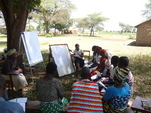Social science team develop guidance for quality assurance in qualitative research
14 June 2013

Social scientists from the ACT Consortium have developed Quality Assessment and Strengthening (QAS) guidelines for qualitative research. The Global Health Trials website published the sample protocol and welcome feedback as part of this month’s theme on Quality Assurance.
A team led by social scientists Joanna Reynolds and Clare Chandler developed QAS, a mechanism, akin to monitoring, that aims to generate feedback for research teams on how their qualitative study is being conducted and can be improved. It also provides a way to demonstrate to funders and other external audiences that a study’s quality has been assured. This approach recommends that research teams engage with social scientists who are external to their studies to establish a reciprocal arrangement for assessing quality.
The team developed the QAS protocol between 2011 and 2012, which includes guidance on prioritising which activities are assessed, selecting indicators of quality and planning how to strengthen the research overall. Research teams can adapt the text and tools to their specific studies.
Two Ugandan social scientists from the ACT Consortium - Susan Naiga and Lilian Taaka - piloted the QAS activities, visiting colleagues working on another ACT Consortium project elsewhere in Uganda. Following evaluation and revisions, it was considered a useful model which could increase collaboration and build capacity for quality assurance of qualitative research in the future.
Filling a gap in qualitative research
Quality assurance is integral to all areas of clinical research, and its processes are defined by international Good Clinical Practice guidelines to protect research participants and the credibility of trial results. However, there is an increasing need to improve, and demonstrate, the quality of qualitative research – traditionally used in social science.
Scientists in the ACT Consortium have had to demonstrate the quality of their research in all studies. The QAS guidelines were developed to make this process meaningful for qualitative research in the context of transnational research projects. In global health research there is often limited science capacity, and geographical distance between principal investigators and field teams can pose challenges for assuring quality.
A future reference for the research community
The authors hope that other investigators will recognise the value of the QAS protocol and its principles. They recommend approaching social scientists - external to their studies - who can adapt and apply this protocol to conduct quality assessments and promote improved quality of their qualitative research.
Through publication of the guidance on Global Health Trials, the authors seek to make the resources easily accessible for researchers across the global health community.
Further information
- Overview of QAS on Global Health Trials website
- Send feedback and comments to the authors of the QAS guidelines and protocol
- Sample protocol for ‘Quality Assessment & Strengthening of Qualitative Research'

